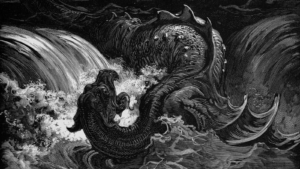God’s association with war in the Old Testament has long been a disturbing problem for Christians. [1] The problem becomes even more intense when we observe that God is called a “warrior.” Admittedly, there have been disastrous Christian appropriations of the theme (e.g., the Crusades). It has been, to state it plainly, both troubling to consciences and a source of sin for Christians.
However, when the theme Lord-is-a-Warrior is announced in the midst of oppression, the options in the human community are for the victim to lament and petition directly to God and to have hope. The Lord hears those who cry out. For the victimizer the options are reduced to repentant change or suffering through the inevitable judgment and exile.
In short, the ones who benefit from the Lord-is-a-Warrior theme are the oppressed. The theme is not an instrument for oppression.
I. A PERVASIVE THEME
This essay focuses on the use of the metaphor of warrior to describe God’s activity. The theme “the Lord-is-a-Warrior” is present in all sections of the Old Testament:
Exodus 15:3: The Lord is a warrior;
The Lord is his name.
IsaiahIsaiah, son of Amoz, who prophesied in Jerusalem, is included among the prophets of the eighth century BCE (along with Amos, Hosea, and Micah)--preachers who boldly proclaimed God's word of judgment against the economic, social, and religious disorders of their time. More 42:13: The Lord goes forth like a soldier;
like a warrior he stirs up his fury.
Zeph 3:17: The Lord, your God, is in your midst,
a warrior who gives victory.
Psalm 24:8: Who is the King of glory?
The Lord, strong and mighty;
The Lord, mighty in battle.
In these verses, the Lord is explicitly called a warrior or directly compared to a warrior. If one moves beyond simple designations to actual functioning, the metaphor or image is even more extensively present. Yahweh is the subject of many verbs that belong to the sphere of warfare.
The most obvious verb to trace is “fight.” In Exodus 14:13-14 Israel is told to watch the victory of the Lord, for “the Lord will fight for you, and you have only to keep still,” and later the Egyptians are said to confess, “Let us flee from the Israelites, for the Lord is fighting for them against Egypt” (14:25). This perspective is mentioned twice in the opening section of Deuteronomy (1:30 and 3:22) and in the defeat of numerous kings in Joshua 10 (verses 10 [sun stood still] and 42 [summary statement]). In JoshuaThe successor of Moses, Joshua led the Israelites into Canaan. More 23:10 the fighting Yahweh becomes the “Multiplier” (1 Israelite with the Lord can handle 1,000 of any others). Isaiah 30:31-32 promises the destruction of Assyria, for “battling with brandished arm [the Lord] will fight [them].”
The language appears in late Old Testament material as well: 2 Chronicles 20:29 describes the fighting activity of God with the result that Jehoshaphat had some peace and quiet, and Nehemiah 4:14 claims the same for the completion of the wall around Jerusalem. Zechariah 14:3 brings us into apocalyptic where God’s warring activity brings about cataclysmic and cosmic changes.
Even a brief survey of this one verb, however, brings up another possibility with the “the Lord-is-a-Warrior” language, namely, that the Lord will fight against Israel. JeremiahProphet who condemned Judah's infidelity to God, warned of Babylonian conquest, and promised a new covenant. More 21:5-6 threatens this in terms that reverse much of the language associated with the exodus:
I myself will fight against you with outstretched hand and mighty arm, in anger, in fury, and in great wrath. And I will strike down the inhabitants of this city, both human beings and animals; they shall die of a great pestilence.
Isaiah 63:10 retrospectively views the exile as just that:
But [the house of Israel] rebelled and grieved his holyHoly is a term that originally meant set apart for the worship or service of God. While the term may refer to people, objects, time, or places, holiness in Judaism and Christianity primarily denotes the realm of the divine More spirit; therefore he became their enemy; he himself fought against them.
If we were to add references to the Lord’s riding the clouds as chariots, roaring in the thunder like a battle cry, smashing and crushing heads, scattering enemies and the like, we would soon augment the list of instances where God functions as a warrior.
What soon becomes clear is that the Lord-is-a-Warrior is coupled to many of the beliefs of the Old Testament:
- The Lord-is-a-Warrior is central to the exodus theme and to the subsequent conquest accounts.
- It is a frequent way to speak of creationCreation, in biblical terms, is the universe as we know or perceive it. Genesis says that in the beginning God created the heavens and the earth. In the book of Revelation (which speaks of end times) the author declares that God created all things and... More in the Old Testament in songs — the Lord defeats RahabWoman who sheltered Joshua's men when they came to spy on Jericho. More and other non-human creatures in order to establish an ordered creation.
- It is present in the Old Testament’s understanding of the significance of exile and in its expression of hope for future restoration (particularly as the future is increasingly expressed in apocalyptic terms).
It is particularly important that the Lord-is-a-Warrior theme be kept because of its centrality in the defense of the rights of the oppressed. The strong, according to the Bible, have a decidedly poor track record in maintaining justice. The hope of the weak does not lie in waiting for the strong to have a change of heart. Rather, God promises to fight against the strong who ignore justice. Lord-is-a-Warrior provides hope for victims. On the other hand, it is a terrifying assertion for victimizers.
The Bible knows full well that this assertion can be distorted. One can imagine an oppressed state of affairs and one can attempt a superficial repentance, but the reality of the Divine WarriorGod was the divine warrior who successfully led Israel into battle (as reported in Miriam's Song in the book of Exodus). This term is later applied to Jesus, especially in the book of Revelation where he rides forth as a divine warrior leading the armies... More exposes all the frauds — or at least that is the biblical confidence. One cannot manipulate the ark, or the templeThe Jerusalem temple, unlike the tabernacle, was a permanent structure, although (like the tabernacle) it was a place of worship and religious activity. On one occasion Jesus felt such activity was unacceptable and, as reported in all four Gospels, drove from the temple those engaged... More, or superficially contain unfair marketplace practices and expect that such conduct will escape the notice of the Lord. The Lord-is-a-Warrior works only if the Lord does in fact do what is claimed. If the Lord does not exist, then the poor are without hope, and the theme is a disaster, subject to all manner of totalitarian abuse.
II. ATTEMPTS TO KEEP THE LANGUAGE OF WAR
Turning more broadly to the issue of war in the Old Testament, several ways of handling the issue of war are frequently encountered. First, it is often claimed by critical scholars that the wars were not as bad or extensive as is commonly thought. It is claimed that Joshua presents an exaggerated and idealized picture that should be balanced with the more ambiguous (realistic?) first chapter of Judges. The issue, however, is not one of quantity, but of quality; attributing any of these battles to Yahweh remains a problem for most readers.
Second, it is often claimed that the wars were only or largely defensive in character. The Lord was only a “defensive” Divine Warrior. Apart from the problems of whether or not such a view is historically correct, it should be noted that the argument is persuasive only to those who accept the just war rationale for the legitimacy of defensive wars. Defensive, last-resort wars are deemed acceptable in the just war tradition because they are the lesser of two evils. The Bible does not, however, argue that God’s involvement in war was the lesser of two evils.
Third, it is commonly assumed that God’s association with combat is part of the older sections of the Old Testament and is lessened as one approaches the New Testament. The language, however, is both early and late. A variation on this approach is to admit that there is a militaristic strand in the Old Testament and then seek to counterbalance it with the peace visions of, for example, Isaiah 2:2-4/Micah 4:1-4. Such a procedure acknowledges the presence of diversity in Scripture but provides no assistance in the resolution of the problems raised by the association of God with war in the Old Testament.
III. WHO BENEFITS?
A more productive starting point is to note for whom the metaphor is used and what the one for whom it is used may or may not do with it. Who benefits from the Lord-is-a-Warrior, and what is the benefactor to do in view of the Lord’s warring? Who benefits? Is it as simple as PsalmA psalm is a song of praise. In the Old Testament 150 psalms comprise the psalter, although some of the psalms are laments and thanksgivings. In the New Testament early Christians gathered to sing psalms and hymns and spiritual songs. More 35:1-3 seems to imply?
Contend, O Lord, with those who contend with me;
fight against those who fight against me!
Take hold of shield and buckler,
and rise up to help me!
Draw the spear and javelin against my pursuers!
Say to my soul, “I am your salvationSalvation can mean saved from something (deliverance) or for something (redemption). Paul preached that salvation comes through the death of Christ on the cross which redeemed sinners from death and for a grace-filled life. More.”
That seems simple enough. Who benefits? I, the speaker, benefit. But it is not that simple, even in this psalm, for the petitioner must wait for the Lord to act and, at the moment of this petition, it seems as though the Lord is only observing. No one benefits if the Warrior does not awake. Joshua may confess after a battle: “There has been no day like it before or since, when the Lord heeded a human voice; for the Lord fought for Israel” (Josh 10:14). But the story of Achan in the next chapter shows that he did not always have this assurance in advance, and neither is it present for this psalmist.
To address more fully the problems associated with the Lord-is-a-Warrior from the vantage point of the question of who benefits we return to one of the passages in which the Lord is called a warrior. In Exodus 15 the Lord is termed “a man of war” (15:3, KJV). The Lord will “reign forever and ever” (15:18). The Lord’s warriorhood is connected to kingship.
Who benefits? It is the Lord’s people, the ones whom the Lord has redeemed from a pursuing enemy. The beneficiaries are defined in relationship to Yahweh and by no other category. To be the beneficiary is to be claimed by the Lord or, in the words of the poem, “purchased” (Ex 15:16). If we look beyond the poem, the picture remains largely the same: the Israelites are termed a “people,” but that is not simply a sociological category because they are specifically the Lord’s people and as such they are different from Pharaoh’s people — that polarity persists in the narrative.
What are the beneficiaries to do? In terms of the poem, they are simply to sing (Ex 15:1, 21). What else? In the earlier chapters in Exodus, there is little else to do but mourn and cry out or, as the exodus draws closer, to prepare for worship/Passover. The people’s posture is that of petition or doxology, not assembling military capacity to engaging in the Lord’s war.
Who does not benefit? Clearly not Pharaoh, and the poem extends that to include the people of Philistia, the chiefs of Edom, etc. (Ex 15:14-16). In short, anyone who has a different allegiance.
What is secured? The people’s continued existence, but more specifically their liberty and the gift of the land (“You brought them in and planted them” [Ex 15:17] — or in other passages: “I gave you a land on which you had not labored, and towns that you had not built, and you live in them; you eat the fruit of vineyards and oliveyards that you did not plant” [Josh 24:13]). Being planted in Lord’s land is the shape that peace takes when the liberating Warrior acts. Justice is also to be one of the results. In the laws in Exodus 20-23 the motive for doing justice is the memory of the injustice from which the people were freed (e.g., Ex 23:9). Doing justice can be understood as a form of doxology, or praise to God.
This is also an indication that Israel should not presume upon the Lord, for the Warrior who heard their cry is ready to hear other cries (Ex 22:25-27). Israel’s recollection of its character as faithless, murmuring and rebelling is an additional protection against a presumptuous dependence on the Lord, the Warrior. Further, the account of Israel in Egypt sharply attributes initiative to the Lord. Everything hinges on the Lord’s hearing, remembering, seeing, and knowing. Israel did physically walk out of the land, but that effort is not theologically substantial in the biblical story. Israel can petition and give praise — or as it more frequently did, it can rebel against the Lord who wars on its behalf.
If things are radically dependent on God, then deep questions about God’s presence through the ambiguities of history arise. As early as Exodus 5:22-23 MosesProphet who led Israel out of Egypt to the Promised Land and received the law at Sinai. More is asking why, and the same question underlies the many instances of Israel’s murmuring. Reality seems to fallThe Fall refers specifically to the disobedience of Adam and Eve when they listened to Satan rather than adhering to God's command not to eat the fruit from the tree. When people act contrary to God's will, they are said to fall from from grace... More far short of the promise and, as a result, the people ask why — or they simply murmur and rebel.
The “who benefits” question is answered by pointing to a people or individuals without strength. The theme does not function to protect privilege. When the entire Old Testament is considered, there is little room to think that the Old Testament underwrites military action. Rather, the theme is invoked in the context of petition (or even lament) or in a praise-filled (or doxological) affirmation of what God has done. The theme is not, therefore, static or abstract in the sense of being a theological position that one can presume upon. The Lord-is-a-Warrior is experienced, not argued.
The theme becomes most problematic when the human community wishes to invoke the theme outside of the posture of petition or doxology. The Old Testament addresses this problem not by abandoning the theme but by asserting that the community that stands outside of petition and doxology will experience the theme as against itself. In prophetic warnings (e.g., Amos 1-2 and especially Jeremiah 21:5-6 cited above) and in its actual history, Israel experienced the theme operating against itself. God fights against the rebellious people of God; the theme is not one-sidedly in favor of the people of God. For example, Joshua 6 (the conquest of Jericho) cannot be read correctly (or at least not completely) without also reading 2 Kings 25 (the beginning of the exile). The theme may be invoked in the midst of oppression, chaos, and exile. It may also be invoked after deliverance from oppression, chaos, and exile, but here the ground becomes slippery, for the language of praise can easily become presumptuous and, when it does, the theme is reversed.
The urge in much of the contemporary church to jettison or simply to ignore the Lord-is-a-Warrior language is often expressed in terms of compassion for the other nations, repulsion regarding violence, and concern for emphasizing God’s gracious characteristics. All of those are positive motivations in and of themselves, but we should still ask ourselves if they are potentially, if not actually, a mask.
Perhaps we wish to avoid the hard questions that the reversal of the Lord-is-a-Warrior theme asks: Does God stand over against us? Does God judge us? Does God war against us and destroy or kill us?
That is one set of questions that the theme raises — a very important set for the victims of many of our actions. We know that to use the Lord-is-a-Warrior as a strategy is to act presumptuously and that it will lead to disaster. But we may nevertheless desire the language of strategy, for it is conditional and implies independence.
Petition and praise, in contrast, involve dependence and do not readily lend themselves to strategy. Lurking underneath our objections to the Lord-is-a-Warrior language may be a desire to rid ourselves of the dependence associated with it. That, in the end, may be what we find most disturbing about the Lord-is-a-Warrior theme.
NOTES:
[1] This article is an abridged and revised version of “Yahweh Is a Warrior” published in Word & World 7/2 (1987) 192-201.





